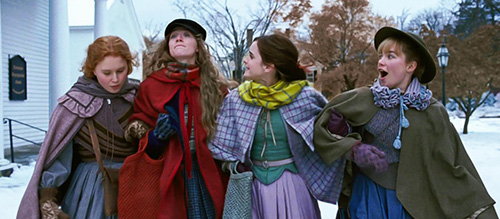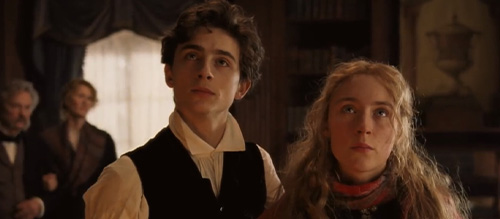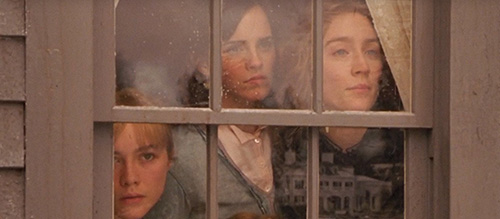Little Women Is the Ultimate Christmas Film, Actually
As the days grow shorter and Christmas draws closer, there seems no better time for some good old fashioned movie watching. From The Holiday to Home Alone, this time of year will bring out the films that we only seem to watch in December. In between the classics, there will be releases whose statuses as Christmas films can be widely debated, and it is one of these that holds the crown for Ultimate Christmas Film. And no – it’s not Die Hard.
The film in question is Greta Gerwig’s 2019 adaptation of Little Women.

Louisa May Alcott’s classic American coming-of-age tale has made its way to the screen multiple times over the years, and while Christmas is a significant factor in all adaptations, Greta Gerwig’s version feels especially like the perfect winter warmer.
Maybe Little Women’s Christmassy nature is influenced by the time in which it was released, with a Christmas Day Opening in the US, and subsequent worldwide releases in the following days. It can’t help but to be associated with the holiday, given that so many saw it for the first time (and sometimes second and third times) in that hazy week that occurs between Christmas and New Year. Its status is also influenced by the number of times we see the holiday portrayed in the film, with each Christmas holding significant weight for our protagonists. From learning the lessons of giving to those in need, to the start of the March family’s friendship with Mr Laurence (Chris Cooper), to the homecoming of the March sisters’ father from the war. For the March family, Christmas serves as a pivotal point in their year.
Above each of these factors, the thing that ultimately makes Little Women a perfect Christmas watch is its inherent cosiness. The harshness of the winter is contrasted by the softness of the simple domesticity of this story. The stakes are low: the narrative action centering around the everyday ups and downs of family life. Whether it’s the girls bundling on top of each other on the floor, or calling each other names, or them sitting around dressed as Englishmen as they play pretend in their attic, Little Women invites us to join the March family in a way that feels genuine and familiar. At a time of year all about connecting with family, it’s a more than welcome invitation. Much like Laurie (Timothee Chalamet) when he first meets them, we don’t have to stand on the side and observe; Gerwig’s maternal guide of the camera, paired with Marmee’s (Laura Dern) warm smile, quickly bring us into the fold, journeying with these characters as if they were friends. In fact, this inclusion of Laurie into the March household extends this familial cosiness, reminding us that while sisterly affection is important, for those who lack blood relatives to offer that, there is always the opportunity to forge your own family.

Cosiness is also found in the familiarity of it all. Familiarity when it comes to the text itself, given the number of adaptations and the regard people have for the novel, but also familiarity in both the little details and the bigger themes. Many will recognise the desire to splurge on that fancy outfit when you know you can’t afford it, just like Meg (Emma Watson). Many will recognise the dream of wanting to be “great or nothing”, just as Amy (Florence Pugh) expresses. Many will feel Marmee and Jo’s struggle of wanting to be more even-tempered each day. And many will deeply feel the weight of the monologue in which Jo (Saoirse Ronan) tells of all the things women are, beyond just their relationship status, vocalising her profound loneliness despite that knowledge. And while there is something of the melancholic in all these associations, there remains something deeply comforting about being known.
Many will also recognise the way Jo laughs as Amy gets her foot stuck in plaster cast, or the way Laurie turns away so as not to laugh when Jo cuts off her hair, or even Beth (Eliza Scanlen) saying she’s scared of boys. The beauty of Little Women is that Gerwig treats none of this as inconsequential – it matters on the screen because it would matter to someone in real life.
Christmas is a time to take stock of the year just gone, and to prepare for the year ahead. The film’s dual narrative, with timelines taking place in both the past and the present, helps us to lean into this reflective spirit. The structure of the film serves to show the parallels between these different eras of Jo’s life, but also serves as a helpful reminder of how the past influences and dictates the choices we make today and who we will inevitably become. As the year draws to a close, this reminder encourages us to look back on the past 12 months and how differently we’ve left them to when we started. The two timelines are distinguished in the film by their different colour palettes, with orange-autumnal tones painting the flashbacks, while the present is depicted in a much colder, blue-tinted tone. In a way, this is a reminder of Christmas: in particular the coldness of the winter outside, contrasted by the glow of a warm yellow light and a fireplace inside. The latter is the comfort we use to seek solace from the cold, much in the way the film shows the past as a nostalgic solace for Jo.

While these are all abstract renderings of what makes Little Women a Christmas movie, there are also clearer examples we can draw upon. Mainly, it’s the fact that Little Women contains a lot of what we’ve come to expect in classic seasonal movies. There are romantic gestures, there’s forgiveness, there are buckets of heart. It celebrates the joys of coming together, but is also unafraid to be a little sad at times. It cares deeply about the things we are prone to overlook. While these themes aren’t present in every Christmas film, they certainly epitomise the film that defines the genre: It’s A Wonderful Life. They also sneak their way into more contemporary offerings including Elf and Love Actually. And even if they weren’t the marks of a good Christmas movie, they would remain, in ways, the marks of a good Christmas.
After 2020’s smaller, more unusual Christmas, this year will mark the first big family occasion for many. Just like the scene in which Father (Bob Odenkirk) stumbles home for the first time in years, there seems to be a sense of anticipation as we get ready to join our loved ones. Greta Gerwig’s Little Women will remind you of fights over games of Monopoly, and angling for the best present from your grandparents, and it will feel like the hug you get from your parents when you first get home for the holidays. Little Women may not be the most conventional Christmas movie, whether you agree with the writer’s bestowing of the title at all, but it will make you feel the warmth and wonder of being alive in a way that feels just a little bit festive.
Written by Rehana Nurmahi
You can support the author of this article, Rehana Nurmahi, at the following links:

